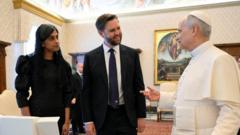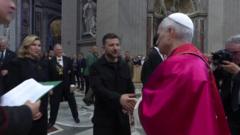**As the papal conclave approaches, online wagers indicate Cardinal Pietro Parolin as the frontrunner, but insiders emphasize the unpredictability of the process.**
**Predicting the Papacy: A Bet on the Next Leader of the Catholic Church**

**Predicting the Papacy: A Bet on the Next Leader of the Catholic Church**
**A surge in online betting marks the first time prediction markets focus on the papal conclave**
In a groundbreaking twist on an ancient tradition, online prediction markets have begun placing bets on the upcoming papal conclave, showcasing a trend that marries modern technology with centuries-old practices. With Cardinal Pietro Parolin of Italy currently leading the bets, the intrigue surrounding the election of the next Pope is reaching new heights.
For the first time, platforms such as Polymarket and Kalshi have drawn the attention of bettors as they navigate the Vatican's intricate selection process. The betting momentum appears strong, even as speculation surrounding Parolin's health surfaced, a claim swiftly denied by the Vatican. Cardinal Luis Antonio Tagle of the Philippines and Cardinal Matteo Zuppi from Italy are also considered formidable contenders according to current odds.
While historical betting on papal elections dates back to 1503, experts note that forecasting the next Pope poses a unique challenge. Unlike the U.S. presidential elections where information is abundant, the conclave's closed-door nature leaves little for prediction markets to grasp. Economist Rajiv Sethi suggests that bettors lack the rich tapestry of public debates and polling data available during electoral campaigns.
The unpredictability of conclave politics has echoed through history. In the last papal election in 2013, Cardinal Angelo Scola was favored, yet Cardinal Jorge Mario Bergoglio emerged as Pope Francis unexpectedly. This cycle, the expected 133 cardinal electors show a divided front, complicating predictions and delaying outcomes that historically rely on networking and covert negotiations.
Stefano Maria Paci, a seasoned Vatican commentator, asserts that crucial decisions made away from public scrutiny can drastically alter the course of the conclave. He emphasizes that the unpredictability makes this “the hardest vote on the planet to forecast.”
Despite the inherent uncertainties, online betting could once again attract substantial investments, with wagers on the conclave already surpassing $27 million. This figure matches the excitement typically reserved for marquee events like the Super Bowl.
As the Vatican prepares for the sacred ceremony, it remains to be seen how the drama of the conclave unfolds, but the convergence of old and new – tradition and technology – is reshaping the narrative surrounding one of the globe's most consequential votes.
For the first time, platforms such as Polymarket and Kalshi have drawn the attention of bettors as they navigate the Vatican's intricate selection process. The betting momentum appears strong, even as speculation surrounding Parolin's health surfaced, a claim swiftly denied by the Vatican. Cardinal Luis Antonio Tagle of the Philippines and Cardinal Matteo Zuppi from Italy are also considered formidable contenders according to current odds.
While historical betting on papal elections dates back to 1503, experts note that forecasting the next Pope poses a unique challenge. Unlike the U.S. presidential elections where information is abundant, the conclave's closed-door nature leaves little for prediction markets to grasp. Economist Rajiv Sethi suggests that bettors lack the rich tapestry of public debates and polling data available during electoral campaigns.
The unpredictability of conclave politics has echoed through history. In the last papal election in 2013, Cardinal Angelo Scola was favored, yet Cardinal Jorge Mario Bergoglio emerged as Pope Francis unexpectedly. This cycle, the expected 133 cardinal electors show a divided front, complicating predictions and delaying outcomes that historically rely on networking and covert negotiations.
Stefano Maria Paci, a seasoned Vatican commentator, asserts that crucial decisions made away from public scrutiny can drastically alter the course of the conclave. He emphasizes that the unpredictability makes this “the hardest vote on the planet to forecast.”
Despite the inherent uncertainties, online betting could once again attract substantial investments, with wagers on the conclave already surpassing $27 million. This figure matches the excitement typically reserved for marquee events like the Super Bowl.
As the Vatican prepares for the sacred ceremony, it remains to be seen how the drama of the conclave unfolds, but the convergence of old and new – tradition and technology – is reshaping the narrative surrounding one of the globe's most consequential votes.




















